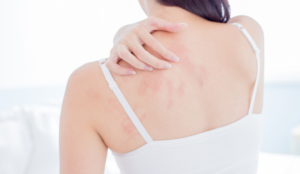Eczema, a chronic skin condition that causes inflammation and itching, can often lead to unwanted scarring. These scars can be emotionally distressing, but with the right treatment and care, it is possible to reduce their appearance and improve the overall health of your skin. In this article, we’ll explore the causes of eczema scars, the best treatments available, and how to heal them effectively.

What Causes Eczema Scars?
Understanding the underlying causes of eczema scars is crucial to finding ways to prevent or minimize them. Here are the main factors that contribute to eczema scarring:
- Persistent Scratching
The intense itching associated with eczema often leads individuals to scratch the affected skin. Scratching can damage the outer layers of skin, which in turn can result in scarring over time. The more you scratch, the more likely scars will form. - Severe or Uncontrolled Eczema
People with severe eczema are more likely to develop scars. When eczema flares up, the skin’s barrier function weakens, making it more vulnerable to damage. Continuous inflammation hinders the skin’s natural healing process, contributing to the formation of scars. - Repeated Episodes of Eczema
Frequent flare-ups of eczema can exacerbate skin fragility, leading to scars even from minor trauma or scratching. Over time, these repeated irritations make it easier for scars to form. - Delayed Treatment
Delaying treatment or failing to manage eczema flare-ups effectively can prolong inflammation, increasing the likelihood of scar formation. Timely intervention is key to preventing scars from developing. - Harsh Skincare Products
Using products that irritate the skin can worsen eczema symptoms and lead to scarring. It’s important to follow a gentle skincare routine to minimize the risk of further damage.
Understanding these causes can help you take steps to minimize scarring by addressing the underlying eczema triggers early.
The Best Eczema Scar Treatment
When it comes to treating eczema scars, it’s essential to select the right approach based on the severity of the scarring and your individual skin sensitivity. Here are the most effective treatments:
1. Topical Corticosteroids
One of the most common treatments for eczema scars is the use of topical corticosteroids. These medications help reduce inflammation and promote healing, which can significantly improve the appearance of scars. However, they should be used with caution, as long-term use can lead to side effects such as thinning of the skin. Always follow your dermatologist’s recommendations for safe use.
2. Silicone Gel Sheets or Creams
Silicone-based products, such as silicone gel sheets or creams, are another excellent option for treating eczema scars. These products create a protective barrier over the scar, helping to reduce redness, flatten raised scars, and improve skin texture. Regular use of silicone gel sheets or creams can lead to visible improvements in the color and feel of the scarred area.
3. Laser Therapy
For more stubborn or extensive eczema scars, laser therapy may be recommended. Laser treatments target specific areas of hyperpigmentation or textural irregularities in the skin. The lasers stimulate collagen production, helping to rejuvenate the skin and improve its overall appearance. Consult with a qualified dermatologist to determine whether laser therapy is suitable for your specific type of scarring and skin type.
4. Moisturizers and Gentle Skincare
Keeping the skin moisturized is critical in the healing process. Using a fragrance-free, hydrating moisturizer helps maintain skin elasticity and reduces the appearance of scars. It’s important to use products specifically designed for sensitive skin to avoid irritation.
While these treatments can significantly improve the appearance of eczema scars, it’s important to be patient, as results take time to show. Consistent care and the right treatment plan will help your skin heal.
Healing Eczema Scars Together
Healing from eczema scars isn’t just about physical treatment; emotional support is also essential. Many individuals experience distress from visible scarring, but it’s important to remember you’re not alone.
Support from Loved Ones and Communities
Connecting with others who have eczema can provide emotional relief and valuable tips on managing the condition. Whether it’s sharing experiences with friends or participating in online forums, finding a support system can make the healing process less isolating. Engaging in open conversations about eczema scars helps break the stigma and fosters a sense of acceptance and empowerment.
Self-Care and Skincare Routines
In addition to medical treatments, incorporating self-care practices into your routine is essential for healing eczema scars. Here are a few tips to help you care for your skin:
- Gentle Cleansing: Use a mild, fragrance-free cleanser to avoid further irritation.
- Regular Moisturizing: Keep the skin hydrated to support its natural healing process.
- Protecting from Irritants: Avoid known triggers that can cause flare-ups or further damage.
Taking care of your skin with nourishing products designed for sensitive skin, alongside emotional support, can significantly improve the healing process and reduce the appearance of eczema scars.
Conclusion
Dealing with eczema scarring can be a long journey, but with the right treatment and a consistent skincare routine, you can improve the appearance of your skin over time. While the healing process may take patience, the key is to stay consistent with your treatment plan and give your skin time to recover.
Remember, eczema scars are not permanent, and with careful management, they can fade. Consult with your dermatologist to develop a treatment plan tailored to your needs, and take a holistic approach to skincare. By nurturing your skin and embracing self-care, you can significantly reduce the impact of eczema scars on your life.
Be kind to yourself throughout this process, celebrate small victories, and keep a positive attitude as you work towards smoother, healthier-looking skin.